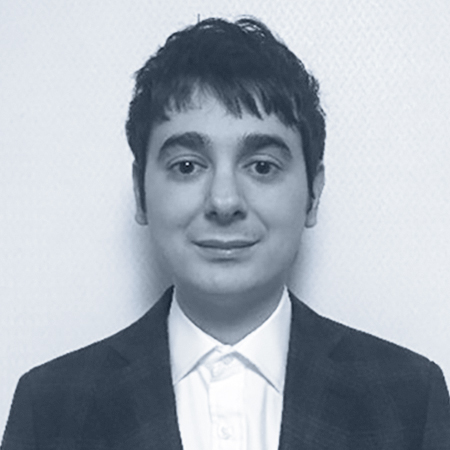
Vasilios Karanikolas
TU Darmstadt,
Institute of Material Science
Contact
TU Darmstadt
Institute of Material Science
Otto-Berndt-Straße 3
64287 Darmstadt
materials_design@nhr.tu-darmstadt.de
Biography
Vasili holds a BSc and MSc from University of Patras in Greece studying theoretical high energy physics. In 2016 he received his PhD from Trinity College Dublin in Ireland, where he focused on designing light emitting and harvesting devices using numerical and semi-analytical meth-ods.
From 2019 to 2022 he was a ICYS Fellow at NIMS Japan. He developed an ultra-fast and ultra-bright quantum photon source, applying state-of-the-art numerical, theoretical and experi-mental techniques.
Since the April of 2023 he joined the Materials Institute of TU Darmstadt to apply machine learning protocols to perform large scale atomistic simulations.
Thematic Advice
Large scale simulations are indispensable for discovering new materials and understanding their properties. Ab initio calculation are time and energy consuming when considering large scale calculations. Machine learning potentials are developed to treat such complicated struc-tures at elevated temperatures. The training data set for the regression machine learning model is created by considering small scale density functional calculations, using on-the-fly active learning.
Vasili can offer his experience on methods to develop the appropriate data set to create the relevant machine learning potential. His expertise extends on how to use the potential to per-form molecular dynamics and thermodynamics calculations.
Vasili and the group that operates within, can provide solutions and develop methodologies to complicated problems that involve the calculations of material properties.
Professional Competence
Vasili’s research focus on developing machine learning interatomic potentials to perform mo-lecular dynamics and thermodynamic calculations for structurally complex material arrange-ments, that are inaccessible for conventional electronic structure methods.
In this context, high performance computing is indispensable to develop the machine learning potential and to perform large scale simulations.
Vasili has worked in numerous projects collaborating with experimental groups to validate their results performing simulations. Moreover, his designed devices have been experimentally realized.